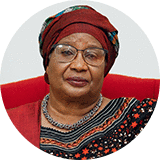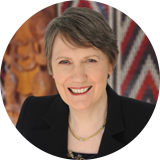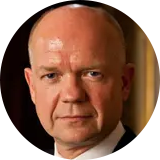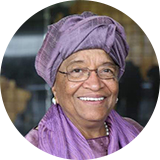Our Patrons endorse and promote GIWL among their networks and in the media, take part in key events and look for opportunities to support the growth of the institute.

Irina Bokova
Irina Bokova was the Director-General of UNESCO between 2009 – 2017. In this role, she actively engaged in the UN efforts to adopt Agenda 2030 for Sustainable Development, including quality education for all, gender equality and the protection of the world’s cultural heritage, including in Mali, Syria and Iraq, denouncing extremists’ destruction of heritage as a tool of war.
Prior to this was the Ambassador of Bulgaria to France, Monaco and UNESCO, and Personal Representative of the President of the Republic of Bulgaria to the Organisation Internationale de la Francophonie. She was previously a Member of the Bulgarian Parliament and served as First Deputy Minister of Foreign Affairs and Government's first Secretary for European affairs.
A graduate of the Moscow State Institute of International Relations, Bokova became a Fellow at the University of Maryland, Washington, and followed an executive program at the John F. Kennedy School of Government at Harvard University.
Bokova was on the Forbes List of the world's most influential women for 2016. She has received state distinctions from more than 40 countries and is Doctor honoris causa of leading universities across the world, including King’s College.

Joyce Banda
An entrepreneur, activist, politician and philanthropist, Her Excellency Joyce Banda served as the President of the Republic of Malawi from 2012-2014. She was Malawi’s first female president and Africa’s second.
Prior to assuming office, President Banda served as a Member of Parliament, Minister of Gender and Child Welfare, Foreign Minister, and Vice President of the Republic of Malawi. While serving as Minister of Gender and Child Welfare, she championed the enactment of The Prevention of Domestic Violence Bill (2006), which provided the legal framework to support the prevention and elimination of all forms of violence against women and girls.
President Banda is an international speaker on leadership, democracy, good governance, and women’s and girl’s rights and motivational speaker.

Helen Clark
The Rt Hon Helen Clark was Prime Minister of New Zealand for three successive terms from 1999–2008. She was the first woman to become Prime Minister following a General Election in New Zealand and the second woman to serve as Prime Minister. Throughout her tenure as Prime Minister and as a Member of Parliament over 27 years, Helen Clark engaged widely in policy development and advocacy across the international affairs, economic, social, environmental, and cultural spheres.
In 2009, Helen Clark became Administrator of the United Nations Development Programme - the first woman to lead the organisation, serving two terms there. At the same time, she was Chair of the United Nations Development Group, and completed her tenure in April 2017.
Helen Clark came to the role of Prime Minister after an extensive parliamentary and ministerial career. Prior to entering the New Zealand Parliament, Helen Clark taught in the Political Studies Department of the University of Auckland, from which she earlier graduated with her BA and MA (Hons) degrees.
Helen continues to speak widely and be a strong voice on sustainable development, climate action, gender equality and women’s leadership, peace and justice, and action on non-communicable diseases and on HIV. She serves on a number of advisory boards and commissions, including in the capacity of Chair of the Advisory Board of UNESCO’s Global Education Monitoring Report.

William Hague
The Rt Hon the Lord Hague of Richmond served as a Conservative Member of Parliament for 26 years. During this time he was Leader of the Conservative Party, then Foreign Secretary, before concluding his political career as First Secretary of State and Leader of the House of Commons.
Over four years as Foreign Secretary, he dealt with the wars in Libya and Syria, withdrawal from Afghanistan, the Ukraine crisis and the struggle against terrorism. He was also responsible for two of Britain's intelligence agencies.
Lord Hague has a unique perspective on different styles of leadership – drawing on numerous debates with Tony Blair and first-hand knowledge of many world leaders, from George W Bush to Vladimir Putin. His mix of public and private sector experience, both domestic and international, has given him deep knowledge of the inside of politics and the reasons for growing instability in world affairs. But he also speaks with great authority on the impact of technological change, population movement, and socio-economic trends.
After leaving Parliament, Lord Hague has focsed on humanitarian work, including the Preventing Sexual Violence in Conflict Initiative which he co-founded with Angelina Jolie. He is an accomplished historian, author of two bestsellers and winner of the History Book of the Year Award, for his biography of William Pitt the Younger.

Ellen Johnson Sirleaf
Nobel Laureate Ellen Johnson Sirleaf is a leading promoter of freedom, peace, justice, women’s empowerment and democratic rule. As Africa’s first democratically-elected female head of state, she led Liberia from 2006-2018, during a period of reconciliation and recovery following the nation’s decade-long civil war, as well as during the Ebola Crisis.
Recognized as a global leader for women’s empowerment, President Sirleaf was awarded the prestigious Nobel Prize for Peace in 2011. She is the recipient of The Presidential Medal of Freedom—the United States’ highest civilian award. Her many honors also include the Grand Croix of the Légion d’Honneur, France’s highest public distinction, and being named one of Forbes’s “100 Most Powerful Women in the World.”
In 2016, President Sirleaf was elected the first female Chairperson of the Economic Community of West African States (ECOWAS) for a twelve-month term. In 2012, she was appointed co-chair of the United Nations Secretary General’s High-Level Panel of Eminent Persons on the Post-2015 Development Agenda.
Prior to her first campaign for the presidency, Johnson Sirleaf served as assistant administrator of the United Nations Development Programme and as director of its Regional Bureau of Africa, with the rank of assistant secretary-general of the United Nations. After coming in second, she went into self-imposed exile in neighboring Cote d’Ivoire (Ivory Coast). While in exile, she established a venture capital vehicle for African entrepreneurs and founded Measuagoon, a Liberian community development NGO.
President Sirleaf has been awarded honorary doctorates by more than 15 institutions, and in addition to her Nobel Prize, she has received numerous honors worldwide.